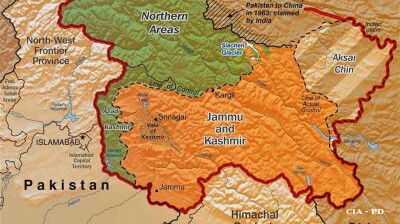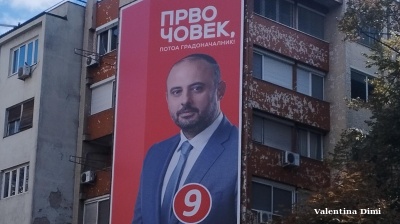NYSK Holdings’s medical cannabis production facility in the huge, deserted complex of the long-idled Ohis chemical plant is well guarded and protected with barbed-wire. bne IntelliNews was not allowed access to the facility in the outskirts of Skopje, but the CEO of the US-owned company was happy to outline its plans for a country that is set to become a major medical cannabis exporter.
Medical cannabis products were legalised in Macedonia by the former VMRO-DPMNE government in 2016, and cannabidiol (CBD) hemp oils are already for sale in local pharmacies. Unlike in most EU countries, production will not be carried out by a state monopoly, which has resulted in a high level of interest in Macedonia as a potential production base for numerous companies, both local and international.
One of these, NYSK Holdings, obtained a license for its brownfield investment at the old Ohis complex on February 23, while the production of cannabis started in May. Its output is intended for both local patients and the international market.
“The company uses indoor technology for plant growing on an area of 1,200 square meters,” NYSK Holdings CEO Zlatko Keckovski tells bne IntelliNews.
NYSK will produce oil, pills, capsules, creams, plugs, inhalers and patches depending on the market needs, with high concentration of CBD and tetrahydrocannabinol (THC), Keckovski says. The export-oriented company is already in preliminary talks with several distribution companies in EU countries where the use of medical cannabis has been legalised.
Part of the production will be also aimed at the Macedonian market, where the products will be offered at “privileged” prices, according to NYSK Holdings’ CEO.
Another company, Macedonian-Bulgarian Ekogas, which is currently active in the construction of gas installations and gas distribution, is waiting for permission to start production of medical cannabis.
"Ekogas was expected to obtain a license, but the issuance was delayed," the company’s director Slave Ivanovski tells bne IntelliNews.
The delay happened most probably due to the transfer of power, after the Social Democrats formed a new cabinet at the end of May following a decade of rule by the conservative VMRO-DPMNE. With the new government now in place, the license is expected to be issued very soon.
Ivanovski was not willing to give more details about the project as the license has not yet been granted. However, sources familiar with the situation believe that this company can become a top producer selling not only to Macedonia, but also to European Union countries. The assumption is based on the fact that the company would be able to offer a range of innovative, high quality products, not only cannabis-based oil.
Ekogas reportedly has a huge facility that would allow it to meet domestic needs, as well as to allocate 95% of its production for exports. The whole process, production of cannabis, drying, testing (for presence of mould or metals) and extraction will take place in Macedonia, with the extraction facility reportedly to be located in eastern town of Sveti Nikole, near Stip. This will be a long-term project, according to bne IntelliNews sources.
The facility, in a remote location outside the eastern town of Stip, includes greenhouses stretching over around 73,000 square metres of land. While - unlike neighbouring Albania - Macedonia is not a major producer of illegal drugs, its new medical cannabis facilities are typically well guarded and in hard to access locations to prevent their crops making their way onto the streets.
Growing competition
Competition in the field of production of medical cannabis in Macedonia is increasing rapidly as new companies are interested in entering the high-potential market alongside those like NYSK that are already active.
This follows the legalisation of cannabis based products by VMRO-DPMNE, which for years had been seeking to bring new international investors to the country. The bill amending the law on control of narcotic drugs, which regulates the production, processing and sales of cannabis-based products, was adopted by the Macedonian assembly on February 22, 2016, with support from both government and opposition MPs. At the same time as legalising medical marijuana, it clamped down on cultivation, dealing and possession of the street drug.
Macedonia was the second country in the Balkans, after Croatia, to legalise medical cannabis. However, the system in Macedonia is somewhat different from most countries in Europe to have taken this step, since Skopje has adopted the Canadian open model of cannabis-based products, rather than setting up production under a state monopoly.
This has led industry sources to be optimistic that Macedonia can be a leader in this area, as development by private companies rather than a state monopoly will encourage those in the sector to offer innovative products and price them competitively.
Macedonia is also expected to become an exporter of medical cannabis products. So far, only Canada, which will be the first country of the G-7 to legalise cannabis for recreational use, and the Netherlands are exporting such products. Other countries have a very restrictive policy on imports and exports.
More choice, lower prices
The newcomers to Macedonia, local and foreign, are expected to offer a wider range of products, particularly for cancer patients looking for better forms of pain relief, as well as those suffering from AIDS, multiple sclerosis and childhood epilepsy.
Tests have shown positive effects of cannabinoids for stress, anxiety and depression, during chemotherapy, for pain relief, prevention of cardiovascular diseases, regulation of blood pressure and high cholesterol and glucose.
There is already some competition in the market, as two licenses for cultivation of cannabis and three for extraction have been granted so far, Keckovski says.
According to the NYSK CEO, there is great interest in investing. Several other companies, from Israel and the Netherlands, have contacted NYSK to share experience on the possibilities in Macedonia.
According to bne IntelliNews sources, Slovenian investors are also interested in entering the market.
However, Canada-based Tilray, which was interested last year in exporting its products to Macedonia, now has no plans to enter the market, as the Macedonian authorities are not interested in imports, but are allowing only domestic production.
As well as broadening the range of products, the entry of new international investors is also expected to bring down prices of cannabinoid products within Macedonia.
Oil with CBD levels of 5%, 7% and 10% is available now in pharmacies in Macedonia, produced by local drug company Replek, but its quality, according to sources familiar with the situation, is not high enough to satisfy the needs of cancer patients.
In addition, while pharmacists say the interest in such products is great particularly among cancer patients, the prices are still high for the local market. The other problem in Macedonia is that medical practitioners are not well educated to prescribe these drugs, which are still considered expensive for the patients in the impoverished country.
However, as competition increased in Macedeonia, the prices of cannabis oil available in local pharmacies has already started to drop significantly. The price of oil with CBD 5% concentration was lowered from MKD1,750 (€28) to MKD1,160, CBD 7% oil was cut from MKD2,420 to MKD1,570 and CBD 10% from MKD3,100 to MKD2,100.
Features

The EU needs to change to stay geopolitically relevant
Leading EU figures are pushing for the unanimity rule used to make important decisions to be dropped to enable faster enlargement — one of the bloc’s main tools for geopolitical influence.

BEYOND THE BOSPORUS: Prosecutors make move on “fictitious export schemes” of Istanbul Gold Refinery
Observers point to intra-regime gangs seizing each other’s wealth, remember Erdogan’s “Hello Fatih” phone calls and ponder whether wanted man Turgay Ciner is in London.

Taliban visit to India upsets Pakistan, signals New Delhi's changing Afghan posture
Coinciding with the visit, Pakistan conducted military operations inside Afghanistan, followed by airstrikes on multiple border towns. Retaliation against Pakistan's police training facilities and border outposts followed.

Pakistan’s India-shaped chip on the shoulder, and why a peaceful coexistence is as elusive as ever
Pakistan must first redefine how it sees India - not solely as a threat to be contained but as a neighbour with whom coexistence is unavoidable. That psychological leap has eluded generations of Pakistani leaders.



